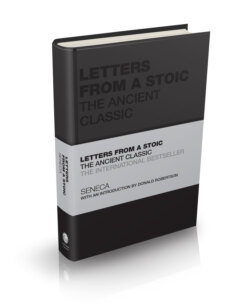Читать книгу Letters from a Stoic - Donald Robertson - Страница 17
SUPER-RICH SENECA
ОглавлениеIn 56 CE, shortly after these events, Seneca was appointed consul, the most senior political office in the Roman senate. Men who had attained consular rank were esteemed as nobles alongside the hereditary patrician class. Moreover, as soon as Britannicus had been killed off, Nero ‘loaded his best friends with gifts', according to Tacitus, presumably dividing up his dead brother's property among his closest advisors. This has been taken by some historians to explain, at least in part, how Seneca rose from moderately well-off provincial origins to become, under Nero, one of the richest men in the empire. Cassius Dio makes the extraordinary claim that Seneca was worth over 300 million sesterces, which would make him the Roman equivalent of a Warren Buffet or Jeff Bezos. Typically, only the Roman emperor himself or his closest associates might command such wealth. Hence another ancient source, the poet Martial, dubbed him ‘Super-rich Seneca’.
Unsurprisingly, Seneca also seems to have owned many properties and a great deal of land throughout Italy, and possibly also in Egypt. We don't know how many slaves he owned, but given his considerable wealth and property, at a rough estimate, they may have numbered over a thousand. As an example of his extravagance, we're told that Seneca owned 500 identical citrus-wood tables with legs of ivory, used for hosting massive banquets. That may sound implausible to modern readers, but it was not unusual for Rome's elite to pride themselves on holding vast banquets, akin to festivals, where hundreds of guests would be entertained. One such banquet, hosted by Lucius Verus, the brother of Marcus Aurelius, reputedly cost 6 million sesterces to put on. Expensive furniture and tableware were highly prized status symbols in elite Roman society.
In 58 CE, a Roman senator called Publius Suillius, who was indicted by Seneca and others for judicial corruption, brought the counter-charge of financial corruption against Seneca. He accused Seneca, perhaps owing to lingering resentment over his exile, of having a vendetta against anyone who had aligned themselves with the Emperor Claudius. However, he also accused Seneca of having enriched himself at the public expense in the short space of four years, i.e. since Nero became emperor. ‘In Rome, he spread his nets to catch the wills of childless men’, alleged Suillius, while ‘Italy and the provinces were sucked dry by his insatiable usury’.
This latter allegation is supported by Cassius Dio's claim that Seneca, wishing suddenly to call in a 40 million sesterce loan made to native Britons under Roman rule, ‘resorted to severe means’ in demanding repayment. Some historians believe this was one of several events that provoked the famous 61 CE uprising against Roman rule in Britain, led by Queen Boudica.
Suillius was found guilty of corruption and sent into exile, forfeiting half his estate. According to Tacitus, Seneca then attempted to go after the man's son in court as well, but ‘the emperor interposed his veto, on the ground that vengeance was satisfied’. In this instance, ironically, his wayward student Nero actually showed more clemency than Seneca. However, worryingly for Seneca, it demonstrated that Nero was now willing to publicly question the wisdom of his teacher's actions.
